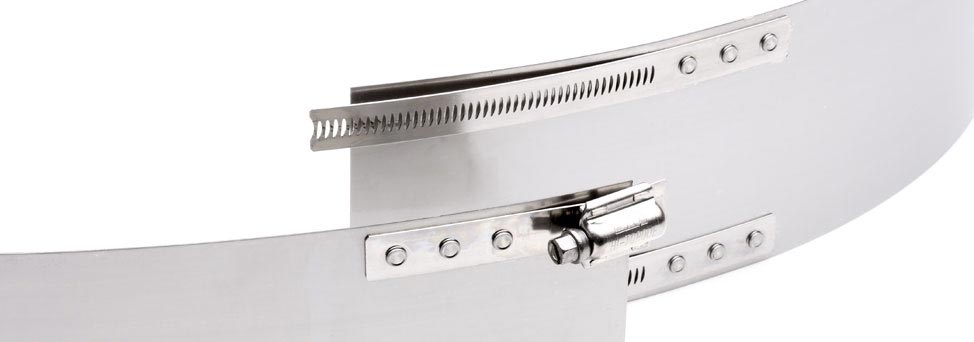Stainless steel refers to a range of iron based alloys which rely on their chromium content for resistance to corrosion. Research in a number of countries worldwide has shown that in normal soils austenitic stainless steel with a 17% chromium and 9% nickel content gives satisfactory performance, with a design life in excess of 100 years.
Whereas in poorly drained gravels, industrial or colliery spoil and in cases where the ground or groundwater contains chlorides (exceeding 1000 ppm) pitting of the steel can occur. In these circumstances the application of a protective wrapping such as “Denso tape” will give adequate protection. Alternatively, in these circumstances an austenitic stainless steel containing molybdenum (minimum 2%) will give better corrosion resistance without the need for additional protection.
Mücher supplies two grades of austenitic stainless steel to suit either normal conditions or conditions when additional corrosion resistance is required. For use in normal conditions Mücher’s standard products use components manufactured from grade 1.4301 (AISI 304) austenitic stainless steel to DIN EN 10088-2. For those conditions requiring higher corrosion resistance then components manufactured from grade 1.4401 (AISI 316) austenitic stainless steel to DIN EN 10088-2 is available, too. This grade contains 2% molybdenum and is especially suitable for marine environments.
|
DIN EN 100 88 |
Trade Name |
International |
Carbon |
Chromium |
Nickel |
Molybdenum |
| 1.4301 | V2A | BS 304 / AISI 304 | ≤ 0,07 | 17,5-19,5 | 8,0-10,5 | - |
| alternatively | ||||||
| 1.4307 | V2A | BS 304 / AISI 304 | ≤ 0,03 | 17,5-19,5 | 8,0-10,5 | - |
| 1.4567 | V2A | BS 304 / AISI 304 | ≤ 0,04 | 17,0-19,0 | 8,5-10,5 | - |
| 1.4404 | V4A | BS 316 / AISI 316 | ≤ 0,03 | 16,5-18,5 | 10,0-13,0 | 2,0-2,5 |
| alternatively | ||||||
| 1.4401 | V4A | BS 316 / AISI 316 | ≤ 0,07 | 16,5-18,5 | 10,0-13,0 | 2,0-2,5 |
| 1.4571 | V4A | BS 316 / AISI 316 | ≤ 0,08 | 16,5-18,5 | 10,5-13,5 | 2,0-2,5 |
The welding of stainless steel requires special competence and care as the steel can potentially corrode, resulting in an intercrystalline attack. Since 2001 Mücher successfully applies the TOX®-Technology which makes corrosion almost impossible.
